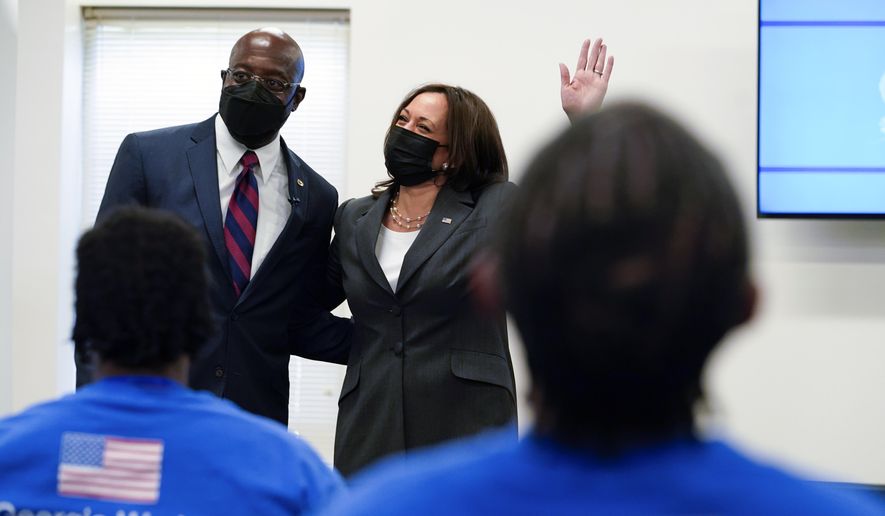Sen. Raphael Warnock turned heads this week when he denied that he had ever opposed laws requiring voters to produce IDs to cast ballots.
It contradicted the multitude of statements he’s made over the years slamming voter ID laws as “discriminatory” and his support for the Democrats’ election law overhaul legislation that would undermine voter ID laws across the country.
“I have never been opposed to voter ID,” Mr. Warnock told NBC News on Thursday. “And in fact, I don’t know anybody who is — who believes people shouldn’t have to prove that they are who they say they are.”
The statement plays well with voters, particularly in Georgia, where he is up for reelection next year. Three-fourths of Georgia residents support the state’s law that requires a photo ID for in-person voting, according to a poll in January by the University of Georgia and The Atlanta Journal-Constitution.
Just two years ago, Mr. Warnock, then chairman of the voter-registration group New Georgia Project wrote an op-ed in The Atlanta Journal-Constitution he accused state lawmakers of usurping voting rights with the ID law.
“More than a decade ago, Republican legislators in the state of Georgia, ironically the home state of Rev. Martin Luther King Jr., led the way in turning the clock back on voting rights by passing unnecessary and discriminatory voter ID laws,” wrote Mr. Warnock, a Democrat. “As shocking as it is, this is just the latest chapter in an old story and, of late, a growing trend in America. Regardless of political party, we should all see it for what it is — an assault on the soul of our democracy, the sacred trust we have with one another as an American people.”
Just three months, Mr. Warnock criticized a new Georgia law that requires people to provide some proof of identity — whether a drivers’ license or state ID number, the last four digits of their Social Security number or a utility bill — when requesting an absentee ballot.
“What the state Legislature did yesterday is to try to arrest the voices and the votes of the people,” he said.
Mr. Warnock, a pastor at Atlanta’s Ebenezer Baptist Church that was once Martin Luther King Jr.’s home base, last year narrowly won a special election for Senate and now faces voters again in 2022 seeking a full term.
He expressed support for voter ID in the TV interview just as the Senate prepares to vote Tuesday on the voting rights bill that Democrats have made a cornerstone of their agenda and a top issue in the 2022 elections.
The bill would, among other things, weaken voter ID requirements in many states by mandating states instead accept a sworn statement testifying to a voters’ identity.
A spokeswoman for Mr. Warnock did not respond when asked to reconcile his statement in favor of voter ID with his support for the bill and his past statements.
His comments drew immediate criticism from the right.
“It’s a lie,” said Hans von Spakovsky, manager of an election law initiative at the Heritage Foundation, a conservative Washington think tank.
The National Republican Senatorial Campaign Committee called his comments an “all-star flip-flop.”
While the Democrats’ election overhaul bill does not cancel voter ID laws for in-person voting, it does require that voters have an option to producing an ID. Voters could instead give a sworn statement punishable under the penalty of perjury, though it is unclear if that penalty would be more severe than the penalty for voter fraud.
The bill also bars states from requiring more than a signature to request an absentee ballot.
The massive 800-page bill would allow voters to register on Election Day, restrict redistricting of congressional districts and create public financing for elections.
The bill’s voter ID workaround would be a far lower standard than Georgia’s requirement of a photo ID. “It’s a loophole you can drive a freight truck through it,” Mr. von Spakovsky said.
Conceivably, Mr. Warnock could argue he is being consistent because a sworn statement counts as voter ID, said M.V. Hood III, a University of Georgia political science professor who headed the January poll.
Many people have a more “expansive” definition of voter ID, he said.
Still, a problem for Mr. Warnock is that he and others believe that requiring a photo ID disenfranchises Black voters. According to the American Civil Liberties Union, 11% of U.S. citizens — or more than 21 million Americans — do not have government-issued photo identification. Nationally, about 25% of Black American citizens of voting age lack government-issued photo ID, compared to only 8% of White citizens.
The ACLU supports the legislation to revamp the country’s election laws, a bill the Democrats have designated as H.R. 1 or the For Act People Act.
In the TV interview, Mr. Warnock went on to say that voter ID efforts have gone too far.
“What has happened over the years is people have played with common sense identification and put into place restrictive measures intended not to preserve the integrity of the outcome, but to select, certain group,” he said.
Several polls show that requiring voters to show photo ID garners support from a majority of Americans and, importantly for Mr. Warnock, Georgians.
A YouGov/Economist poll in March found that 53% of Americans support requiring a photo ID to vote, while only 28% were opposed.
The University of Georgia/Atlanta Journal-Constitution poll found an overwhelming 74% of Georgians support requiring photo ID or other documentation to vote. The requirement was backed by 91% of those identifying themselves as conservatives and 55% of those self-identified as liberals.
• Kery Murakami can be reached at kmurakami@washingtontimes.com.




Please read our comment policy before commenting.